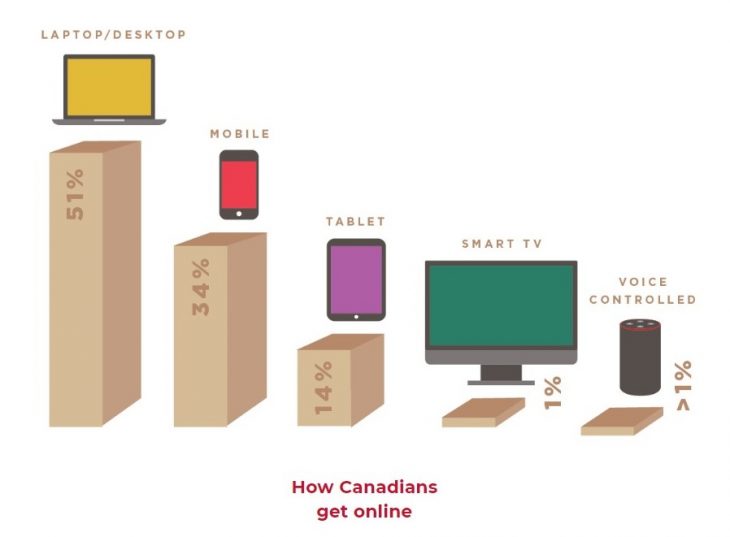
OTTAWA – Almost no one goes “off the grid” anymore and most watch TV and surf at the same time.
That’s just a couple of the intersting findings from the Canadian Internet Registration Authority’s annual look at the state of the nation’s internet—Canada’s Internet Factbook 2019. The survey of more than 2,000 Canadians found that 85% had not gone “off-the-grid” (spent more than one-week offline) in the last year, and only one in five had even disconnected for eight consecutive hours.
The report’s other key findings include:
- Boomers and seniors have embraced smartphones. Those 55+ who browse the web using mobile devices has increased from 24% in 2015 to 57% in 2019
- Three-quarters of Canadians surf the internet while watching TV
- 62% say their household has a cable TV subscription and 31% say they watch TV/movie content by using the video-streaming apps of individual TV networks
- 71% are willing to pay for copyright-protected content while 13% admit to intentionally accessing or streaming pirated film or TV content online
- 46% of Canadians admit to using their mobile device in the bathroom (and even more were too embarrassed to say)
- 73% of Canadians says they’re concerned about potential privacy violations from using Facebook.
- 29% believe their mobile device is “definitely” or “probably” listening to them via the microphone without their permission.
The internet is changing many aspects of our lives, too. For example:
- 9% completed their education online
- 16% found a home online
- 22% found a job online
- 10% found their spouse online
- Canadians prefer to buy from Canadian retailers online with 64% saying they buy Canadian
- 45% of respondents provide informal tech support for others in their family
- Seven in 10 internet users say they would be unlikely to purchase a home in an area that didn’t have high-speed internet
When it comes to internet speeds, New Brunswick lost its lead as both British Columbia (52.28 Mbps) and Alberta (52.14 Mbps) surpassed New Brunswick (50.41 Mbps) in 2019. Average download speeds in urban households are rapidly outpacing rural homes. Between 2018 and 2019, average download speeds in urban areas more than doubled, while rural download speeds grew just over one-and-a-half times.
That said, test results show a dramatic increase in the average Canadian home internet download speed – from 20.5 Mbps in 2018 to 42.4 Mbps in 2019. Average upload speeds also jumped to 17.5 Mbps from an average of 11.3 Mbps in 2018.
Quebecers are the most likely to seek out Canadian content online with 22% saying they often or always do so. British Columbians are least likely with 39% indicating they never or almost never look for Canadian content online.
“The internet has transformed every aspect of our lives—mostly for the better. Our challenge moving forward is to develop a healthy relationship with the internet and harness it to improve the lives of all Canadians,” said Byron Holland, president and CEO, CIRA, in the press release.
“We see major leaps in internet connectivity happening all across the country but we still have a ways to go. Considering how critical fast, reliable internet access is to our economy, our communities and our lives, we must keep pushing to ensure Canadians from coast-to-coast-to-coast are well connected,” added Jacques Latour, chief technology officer, CIRA
A total of 2,050 adult Canadian internet users (18+) were surveyed in March 2019, and the sample is proportionate-to-population for age, province and gender. Additional data was taken from the M-Lab and global domain industry statistics from Zook, CENTR and ntldstats.com, notes CIRA.



